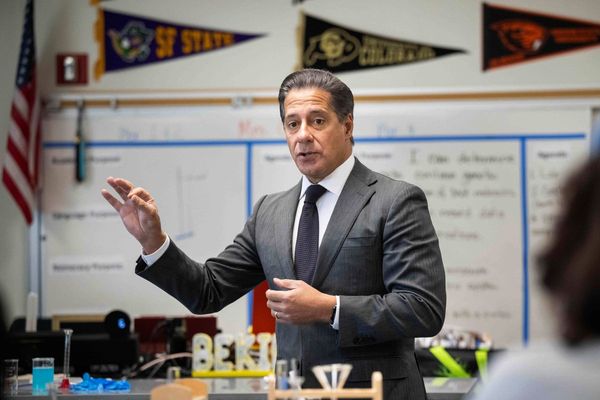
National community service is being considered among a suite of options to boost recruitment to fight fires, but the Australian emergency services minister has suggested service is likely to remain voluntary.
On Sunday, Murray Watt revealed that national community service, an idea championed by influential crossbench senator Jacqui Lambie, is the “sort of option is under consideration” through a home affairs department review.
But Watt told ABC’s Insiders he “wouldn’t want to commit to obliging people or forcing them to do so” because “it might be possible to do it in a voluntary manner”.
Despite concerns that hazard reduction burns have been hampered by hot conditions and minister for regional development, Kristy McBain, warning of concerns land management had not “progressed substantially”, Watt said Australia is “much better prepared for this coming season than we were heading into Black Summer”.
The defence strategic review and a separate parliamentary inquiry have both warned that Australia must break its reliance on the defence force as a workforce to respond to natural disasters and return to using them as a last resort.
The Australian defence force’s war-fighting ability may “soon be degraded” by the increasing burden of responding to natural disasters and domestic crises, joint standing committee on foreign affairs, defence and trade warned earlier in September.
On Sunday, Watt said the Albanese government “will always make the defence forces available when they are needed”. “But what we need to do is recognise that they should be used as a last resort, rather than a first port of call.”
Watt said there was “no doubt” the ADF would be deployed in situations like the Lismore and Northern Rivers floods in New South Wales, and recent floods in the Kimberley, which required use of aircraft from Townsville.
“But it is about making the balance right and not over-relying only them.”
The Albanese government has allocated $200m a year from the disaster ready fund for disaster prevention and resilience, including $38.3m for the veteran-led Disaster Relief Australia to reduce pressure on the ADF.
In April, Tony Sheldon, the Labor senator and special envoy for disaster recovery, said the federal government should help locals respond to emergencies before considering creating a new civilian agency.
Watt said that options like a semi-professional firefighting service, as exists in California, and national community service were both the sort of options that are under consideration through the review.
“I think there would be young people out there who would be more interested in providing that kind of community service than they might be for enlisting in the army reserves or things like that.
“I think we should be thinking about all options thinking about how we meet out future needs, because we are going to need more people.”
Asked if young people could be required to serve, Watt said: “Again, I wouldn’t want to commit to obliging people or forcing them to do so.
“It might be possible to do it in a voluntary manner, such as we do with the army reserve at the moment. We don’t force people to join the army reserve.”
“But there are a lot of people who want to choose that option and similarly there may be a range of people open this as well.”
Part-time army reserve volunteers benefit from perks including guaranteed leave from their normal job and that their pay and allowances are exempt from income tax.
Watt suggested the federal government could do more to support the states and territories, given emergency management is “primarily led” by that level of government and the federal government had to be “cautious” about overstepping its responsibility or duplicating their efforts.
“But the fact is we are facing a difficult, changing climate and we need to be ready and we need to think differently.”
The comments come ahead of a disaster preparedness summit in Canberra, which Watt said would bring together about 200 or 300 leaders from the fire authorities, community services and private sector to discuss preparedness for bushfires and other natural disasters.
Watt said the prime minister, Anthony Albanese, would include a “scenario test” on its second day to try to “find any gaps that might exist in the system before we get to this summer”.







